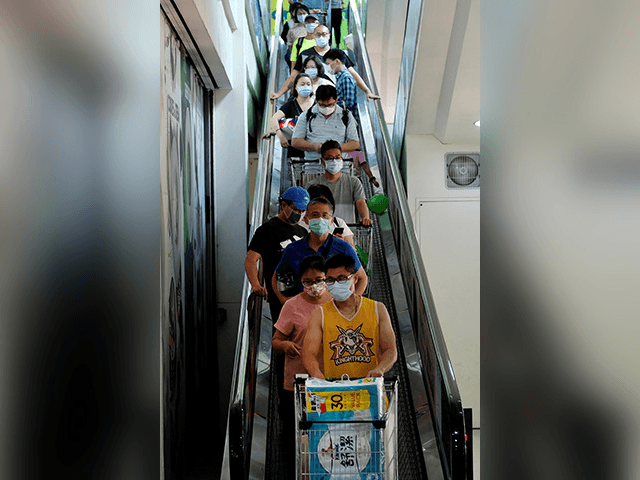Taiwanese President Tsai Ing-wen urged people in Taiwan not to hoard food and masks on Saturday after a recent Chinese coronavirus lockdown order in Taipei and its surrounding area caused residents to panic buy basic household supplies.
Taiwan’s government raised its four-tier coronavirus alert system to a level three for the first time on May 15, issuing partial lockdown orders for its capital, Taipei, and the surrounding New Taipei City in response to a recent surge in new daily Chinese coronavirus cases in the region. The order sparked a panic buying frenzy in the capital area on Saturday, as residents scrambled to stock up on essential goods. Photos circulated on social media of Taipei supermarkets with empty shelves and long lines of customers.
“Taiwan has seen long queues in retailers and supermarkets since noon,” Focus Taiwan reported on May 15. The panic buying forced Taiwan’s Ministry of Economic Affairs to issue an order on Saturday restricting the number of products Taiwanese were allowed to purchase in one shopping trip.
“Each customer can only buy up to two items in the categories of toilet paper, instant noodles, rice and canned food, respectively,” the ministry said in a statement.
“Taiwanese swooped up toilet paper, antibacterial laundry detergent, dishwashing detergent, alcohol-based disinfectant, surgical masks, meat, fresh produce, and instant noodles,” Taiwan News reported on May 13, when Taipei residents first learned that the government’s level three alert order was imminent.
Taiwanese President Tsai Ing-wen advised people in Taiwan to refrain from hoarding “masks, food, and toilet paper,” in a statement posted to her official Facebook page on May 15.
“Panic buying at supermarkets would only increase the risk of COVID [Chinese coronavirus] clusters,” the president wrote, according to Taiwan News.
Taiwan’s level three coronavirus alert order requires people to wear masks at all times during public activities. It limits indoor gatherings to five people and outdoor gatherings to ten.
“A wide spectrum of business and public venues are to be closed [according to the order], with the exception of essential services, police departments, hospitals, and government buildings,” Taiwan News reported.
Taiwan Health Minister Chen Shih-chung announced further virus-prevention measures — in addition to the level three alert — on May 16 for Taipei and New Taipei, including “remote learning for some school years, and guidelines for hospitals to prioritize symptomatic Covid [Chinese coronavirus] cases, saying dedicated beds were beginning to fill.”
Taiwan’s Central Epidemic Command Center (CECC) held an emergency press conference on May 15 to announce 180 new, locally transmitted cases of the Chinese coronavirus in the country, which was “the largest number of domestic infections reported in one day since the start of the pandemic in Taiwan,” according to Taiwan News. The majority of the new cases were documented in Taipei (89) and New Taipei City (75).
“Taiwan reported 206 new local cases of the Chinese coronavirus May 16, “breaking the previous day’s record high of 180,” the U.K. newspaper the Guardian reported.
Health experts cautioned the public that Taiwan’s sharp rise in Chinese coronavirus case numbers on Sunday was “probably partly a result of mass testing drives over the weekend,” the newspaper noted.
New Taipei City Mayor Hou You-yi announced on May 17 that preparations were currently underway in the city “to raise the COVID-19 [Chinese coronavirus] alert to Level 4, after 333 new local COVID-19 cases were reported on Monday (May 17),” Taiwan News reported.
Taiwan’s level four coronavirus alert order mandates the following, according to the Taiwan CECC:
People can only leave home for essential activities and must wear a mask and maintain a social distance at all times.
Even when at home, masking and social distancing must be practiced.All public events canceled, with the exception of essential services such as law enforcement, medical and government services.
All in-person school and work activities suspended.
Lockdowns will be imposed in counties, cities, or townships where an outbreak has become severe. Only designated persons may enter or leave these lockdown zones, and residents must stay in their homes.
“The Central Epidemic Command Center (CECC) on Saturday (May 15) said there would only be [level 4-style] lockdowns if there were at least 100 new infections per day for 14 consecutive days,” Taiwan News noted on Monday.

COMMENTS
Please let us know if you're having issues with commenting.